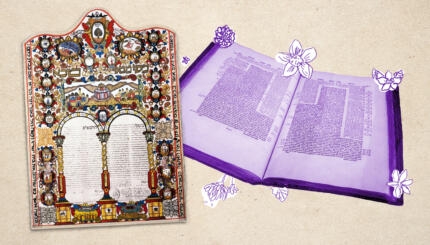Yesterday’s daf ended with a bit of a cliffhanger: Who bears responsibility for the cost of burying a levirate widow who has not yet married her late husband’s brother? On today’s daf, the Gemara explores two possibilities: Either the husband’s heirs (referred to on our daf as “the orphans”) pay to bury her as part of their inheritance of her marriage contract, or her father pays as part of his recovery of any property that entered the marriage with her.
The Gemara begins by explaining the first position:
Her heirs, the heirs of her marriage contract, are obligated in her burial. Abaye said: We too learn: A widow is sustained from the property of the orphans, and her earnings are theirs, and they are not obligated in her burial. Instead, her heirs, the heirs of her marriage contract, are obligated in her burial. And who is the widow who has two heirs? You must say that this is a widow waiting for her yavam.
Abaye supports the view that a levirate widow is buried by her husband’s heirs by citing a mishnah that we’ll encounter on Ketubot 95b. That mishnah states that a widow is supported by her children (presumably a similar group as her late husband’s orphans, although not necessarily the same people). But if she dies, her burial is paid for by her husband’s heirs. What type of widow has two sets of heirs? Only a widow who has not yet married her yavam.
With your help, My Jewish Learning can provide endless opportunities for learning, connection and discovery.
Rava disagrees:
Rava said: But let (the yavam) say: “I inherit my brother, while his wife I am not obligated to bury.”
Abaye said to him: “Because they come upon him from two sides. If he inherits his brother, he should bury his wife. If he does not bury his wife, he should give her marriage contract (to her).”
Rava objects that the yavam could legitimately claim he has no obligation to bury the widow because the marriage was never consummated and he therefore has no legal responsibility toward her. But Abaye presents a compelling counterargument: If the yavam takes on his deceased brother’s benefits under the ketubah, he should take on his obligations as well, including the obligation to pay for his wife’s burial. It seems unreasonable that a yavam should reap the rewards of the ketubah without shouldering any of its responsibilities.
But Rava isn’t done:
Rava said to him: I say as follows: (The yavam claims that) I inherit my brother, and his wife I will not bury. And if (the brother should be responsible) due to her marriage contract, a marriage contract cannot be collected during the husband’s lifetime.
Rava is getting a bit picky here. A husband’s financial obligations to pay money under a ketubah come into force only upon divorce or his death. In this case, there’s no divorce, because the marriage was never consummated, and the yavam is still alive. So neither of the two triggering events for payment under the ketubah have taken place. As a result, he argues, he’s entitled to keep it all.
The Gemara doesn’t settle the debate, but the answer was codified in the Shulchan Arukh in the 16th century. There, Rabbi Joseph Caro sides with Abaye, ruling that the deceased husband’s heirs receive her ketubah monies and are obligated to pay for her burial. The upshot: If you get the benefit of the ketubah, you also take on the duty of ensuring that the woman connected with it receives a proper burial.
Read all of Ketubot 81 on Sefaria.
This piece originally appeared in a My Jewish Learning Daf Yomi email newsletter sent on September 25th, 2022. If you are interested in receiving the newsletter, sign up here.



